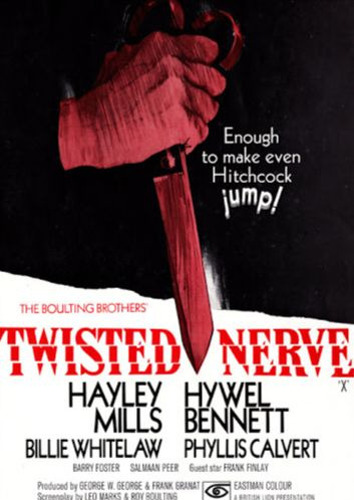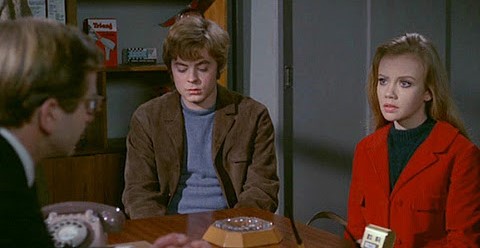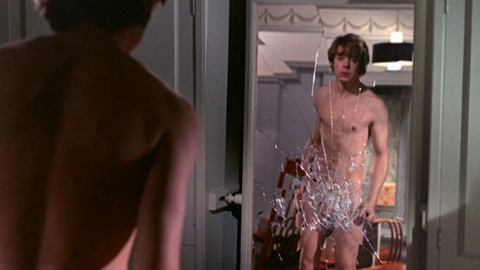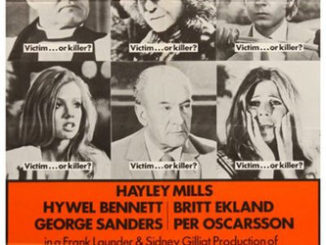Twisted Nerve (1968)
Directed by: Roy Boulting
Written by: Leo Marks, Roger Marshall, Roy Boulting
Starring: Billie Whitelaw, Frank Finlay, Hayley Mills, Hywel Bennett
UK
AVAILABLE ON DVD
RUNNING TIME: 114 mins
REVIEWED BY: Dr Lenera, Official HCF Critic
Martin Durnley’s father died years ago, his mother has a new husband whom he hates, and his brother has Down’s Syndrome and lives at a special school. Martin is lonely and refuses to accept adulthood: he also has an alter-ego called Georgie who speaks and behaves like a child. As Georgie, he befriends a young woman called Susan Harper when she pays for a toy Martin tried to steal from a shop. He starts to become infatuated with her and concocts a plan to leave home, pretend to go to Paris, but to actually live in the same place as Susan. As Georgie, he shows up late one night at Susan’s mother’s house, where she rents rooms, and is eventually allowed to stay….
This is one of those films [I’m sure most of us have some] that I always remember to be better than it actually is. I wrote a small review of it way back in the early days of this website, but decided to revisit it, the reason being that I’ve not long seen another dark thriller also starring Hayley Mills and Hywel Bennett with music by the great movie composer Bernard Herrmann [Psycho, Citizen Kane, Taxi Driver, Jason And The Argonauts] Endless Night made only five years later, so thought it would be fun to review them together. In fact there are many other similarities between both movies which will be evident upon reading the review of the second film [coming up!], but for now let’s just talk about this one, which for a while seemed partly forgotten. However, one of its fans was a certain Quentin Tarantino who showed it on the first year of his Quentin Tarantino Film Festival in 1997 and subsequently used its whistled musical theme in Kill Bill Vol. 1. The piece became popular and there was a short fad for using it as a ring tone – which is probably why Tarantino later had it on one in Death Proof. Cursory reading about Twisted Nerve would lead one to believe that it’s either an early slasher or a nerve-shredding suspense thriller, but it isn’t really either of those things. It’s more of a psychological study of a psychopath, or rather an attempt at a psychological study of a psychopath, because it gets kind of lost along the way and ends up being rather unsatisfactory. It’s one of those pictures that’s certainly intriguing all the way through, and it has a very fine performance by Bennett which could be the finest I’ve ever seen him give, but it never gets as good as it threatens to get, being mostly content to just plod along keeping the viewer’s attention but never making much effort to thrill or scare him or her, though one thing I do really like about it is that it never tells us whether Martin is putting it on when he becomes Georgie or whether it’s all an act.
The Boulting Brothers usually made satirical comedies, some of them excellent like I’m Alright Jack. Twins Roy and John alternated producing and directing chores; here, John produced, while Roy directed and co-wrote with Leo Marks, probably chosen because he scripted Peeping Tom eight years before. Bennett and Mills had just starred in the very different The Family Way for the Boultings. Initially this project had no title, but one was eventually found, it coming from the poem ‘Slaves’ by George Sylvester Viereck which was put twice into the movie and suggests that one’s character and actions can all be traced back to one’s genetic makeup. Shooting took place at Shepperton Studios and Burley House in Twickenham which happened to be the home that Mills shared with Roy Boulting. It’s been suggested that Boulting taking over management of her career virtually ruined it because of bad decisions. Controversy appeared when it got out that the script claimed that people with Down syndrome, then called mongolism, were more likely to become criminal or insane than anyone else. Letters of complaint were sent to the BBFC including one from the National Association for Mental Health, while the film’s medical adviser, Professor Lionel Penrose, asked for his name to be removed from the credits. Roy Boulting said these complaints caused him “shock and surprise and a deep sense of regret and depression”, so he added an opening disclaimer which erroneously said that the movie didn’t say what it most definitely did say, though David Ennals, Minister for the State of Health, still publicly criticised the film for what it was claiming. None of this helped at the box office, despite misleading marketing in the USA suggesting a gory slash fest.
We open with Martin playing catch with his older brother Pete, who has severe learning difficulties and has been sent to live in a special boarding school in London by their mother Enid. Martin seems quite likable here, being the only person in the family who appears to really care about Pete, who doesn’t have much longer to live – though he does drop and smash his cup of tea when his mother is mentioned. Now you’d think that Professor Fuller, who sees him do this, would be really worried about it, but then considering the crap he talks later he can’t be a very good doctor. After the chromosome-filled title sequence, Martin espies Susan in the toy shop and presents himself as mentally challenged and called Georgie when questioned by the manager for stealing, but clearly makes a mental note of her address. Already the suggestion is being put to us that Georgie is all an act, but soon after this we see him alone rocking in a rocking chair while smiling meekly in the mirror and caressing a stuffed animal, the camera then panning down to reveal that the rocking motion of the chair is smashing a photo of his stepfather. We hear some perverse past behaviour being alluded to by Enid and her second husband Henry. Enid seems to refuse to believe that there’s anything wrong with her son, but Henry just wants the jobless loafer out. Martin pretends he’s in Paris, but in reality turns up on the doorstep of Susan’s mum Joan’s house with a supposed note from step dad. Joan doesn’t want him there but Susan takes pity on him and talks her mother round. However, she’s soon to regret this as he becomes ever closer to Susan and extremely jealous of her several beaus. As indeed is Joan, who warms to her strange lodger when she sees him mowing the lawn with his top off, even though he sometimes acts as if she’s his mum. But Martin’s a coiled spring.
Tension is hardly rife, though there’s a good bit when Martin is trying to sneak out of the house to commit some deadly business; he’s in danger of being seen but we want him not to be, so well are we being manipulated. Marks’s script is very wordy, and could have benefited from some pruning here and there. There are a few mild chuckles involving the police investigating the case, such as the captain having a go at an officer standing around drinking tea before taking the cuppa off him, drinking it himself before giving the empty cup back to him. There’s lots of chat at Susan’s home, yet we still never learn much about Susan who remains a confusingly written character: for a start, does she fancy Mark or not? Barry Foster has some good moments as Gerry, a lodger sleeping with Joan [the seeming noise of a bed creaking caused by them having sex turning out to be Martin on a rocking horse is an amusing surprise] who’s a film editor and thinks that sex and violence should be the main ingredients in a movie. He sits at the breakfast table giving racial slurs to another lodger Shashie who is Indian, making sexist comments about Susan and, in a very funny scene, thinking that both Shashie and Martin have been sleeping with Joan. Seeing as Shashie gives as good as he gets without being crude, and given the diversity of the respective characters’ status – one’s an eminent surgeon, the other ends up semi-alcoholic and jobless – one wonders whether this was a jibe by Marks at the thoughtless racial attitudes of the time, though I’m not sure that we needed another doctor calling Sashie “the maharaja”. Which leads me to the whole Down syndrome element. Even the PC-hater that’s me bristles when I hear Professor Fuller’s speech linking mongolism and criminality/psychopathic behaviour, it’s just downright horrid.
Marks presents a lunatic as interesting as Peeping Tom’s, but gets confused in presenting him. Martin’s full of seething rage and disdain and an occasional murderer when he snaps, and seems to use his alter-ego Georgie often when he wants something. It’s fine that we never find out if Georgie is pretence or not. But the dumb biological explanation for his condition in the final reel pretty much makes redundant the psychological profiling we’ve had prior to this, where it seems in particular that Enid’s suffocating upbringing is the reason for the way he is – which means that said biological explanation is not just unpleasant but doesn’t even need to be in the film! Martin wants to have sex with Susan even if she doesn’t want it herself, yet hates it when he gets an erection. He also seems oedipal, is certainly schizophrenic, and an early scene shows him about to masturbate to body-building magazines, maybe hinting that he is gay, and certainly showing that he’s narcissistic, something shown in an unsettling moment which may or may not be a dream. Martin undresses and gazes at his mirror, desperately examining himself for the slightest imperfection. The mirror fractures as he stares at it, shattering his reflection over the most intimate area of his body. This element plays into the climax quite cleverly, but when we see Mark reading a book called psychopathia sexualis, it feels as if Marks trotted through its chapter headings and decided to cram as many of them in as he could without upsetting the censors but showing little thought.
There are killings by scissors and axe [the first shown a little, the second not at all], plus the odd good visual moment such as the camera sliding under the stairs to show the light reflecting off a pair of scissors. Boulting employs some familiar but still decent devices like the camera slowing zooming into a shed in which something nasty has taken place, but in general doesn’t seem that engaged with the material, and makes no attempt to disguise the curious artificiality of a street set which really jars with the real locales elsewhere. Overall Twisted Nerve is duller than it ought to be, a shame as it certainly has its interesting ingredients. And Bennett is fantastic throughout, particularly the way he subtly changes from one personality to the other with just a look indicating the transformation. Hayley Mills is okay but at times seems a bit [understandably] confused about her character, and is so thin that she looks like a stick-insect. Herrmann’s whistling theme remains catchy and entirely appropriate to Martin/Georgie but is rather overused, from playing in jazz arrangements on stereos to Martin whistling it, with even most of the suspense cues just playing around with the first phrases of the theme. While the release of the complete score a few years ago revealed some nice unused cues, and the lack of strings is an interesting device, the score overall is a rather lazy, self-derivative [the usual descending two note and four note patterns] effort from Herrmann. Again, Twisted Nerve wasn’t as good as I remembered, yet I’ll admit that there’s something rather compelling about it, which must be what draws me back. Occasionally, it does seem on the verge of showing us what someone like Martin could be like, and some sympathy is aroused from this lonely, sad character. You’re actually happy for him when he has a temporary respite from his troubled existence, a brief idyll when Susan takes him swimming instead of one of her other male friends. After all, he basically just wants to be loved. Don’t we all?
Rating: 















Why did it take so long for twisted nerve to be shown on British television